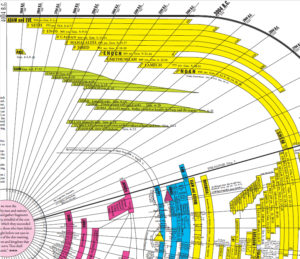Genesis 5 – Lifespans of the first people
 Skeptics may never accept that the first people lived several hundred years. They have created non-provable theories about why we shouldn’t believe people really lived that long.
Skeptics may never accept that the first people lived several hundred years. They have created non-provable theories about why we shouldn’t believe people really lived that long.
But if we take God’s Word to mean what it says, we know that God created man to live eternally. Because of man’s sin, death entered the human race and life spans were limited.
Keeping that in mind, we should expect the first people to have superior genes that would let them live much longer lives than we do today. There were several instances in the biblical narrative that God chose to shorten the life span of mankind.
The strong genes of the first people also made it possible to start several generations to populate the earth without the risks we have today when relatives marry. The children of Adam and Eve apparently married brothers and sisters, unless God created more people without including that information in the Bible. When we read genealogies in the Bible, only a few prominent women are generally named, so we have to accept that the Bible tells us what we need to know, and often omits details we might wonder about.
I find it fascinating that the longevity of those first people should have made it possible for information to be passed accurately over hundreds of years. Consider that Adam was still living when Methuselah was born, and Methuselah was living until just before Noah’s flood. Enoch, who walked so closely with God that he entered God’s presence and was no more, was Methuselah’s father and Noah’s great-grandfather. It is quite probable that Enoch learned much from Adam and Eve and passed the information on to Methuselah who passed it on to Noah, his grandson. Click on the image at the top of this post to enlarge it so you can see the names and life-spans and more about the first people. This image is a portion of the “World History Chart” published by Bible Charts and Maps, LLC available for purchase at www.AmazingBibleTimeline.com .
I personally prefer to take the Bible as literally as possible with an attitude that it gives us the information God wanted us to have, and in a form that the people who first wrote and read it would understand. We must at the same time recognize the differences in languages and the difficulty in translating the Scriptures from Hebrew and Greek to English in a concise manner. Sometimes, the most accurate translation could end up being a paragraph when we don’t have an English word that comes close enough to match word-for-word.

Comments
Genesis 5 – Lifespans of the first people — No Comments
HTML tags allowed in your comment: <a href="" title=""> <abbr title=""> <acronym title=""> <b> <blockquote cite=""> <cite> <code> <del datetime=""> <em> <i> <q cite=""> <s> <strike> <strong>